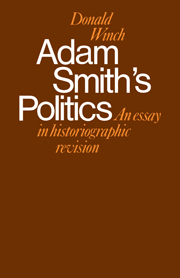Book contents
- Frontmatter
- Contents
- Acknowledgements
- Abbreviations
- 1 Introduction: the problem – the liberal capitalist perspective
- 2 Republicanism and sceptical Whiggism
- 3 Hutcheson and Smith: Real Whig versus sceptical Whig
- 4 Commerce, liberty and justice
- 5 Martial spirit and mental mutilation
- 6 A ruinous expedient
- 7 The present disturbances
- 8 Conclusion
- Bibliography
- Index
- Title in the series
3 - Hutcheson and Smith: Real Whig versus sceptical Whig
Published online by Cambridge University Press: 03 February 2010
- Frontmatter
- Contents
- Acknowledgements
- Abbreviations
- 1 Introduction: the problem – the liberal capitalist perspective
- 2 Republicanism and sceptical Whiggism
- 3 Hutcheson and Smith: Real Whig versus sceptical Whig
- 4 Commerce, liberty and justice
- 5 Martial spirit and mental mutilation
- 6 A ruinous expedient
- 7 The present disturbances
- 8 Conclusion
- Bibliography
- Index
- Title in the series
Summary
The sketch of the ground-plan of Smith's ambitious scheme of studies given in the first chapter of this essay makes it plain that the most obvious place to begin consideration of his science of politics is with the Lectures on Jurisprudence. The two sets of notes on these lectures enable us to form an impression of the line of approach Smith was pursuing in the 1760s, prior to his decision to develop the material on police, revenue, and arms into a separate work on the Wealth of Nations. It is well known that the general pattern, and sometimes the order, if not emphasis, of Smith's teaching at Glasgow was closely modelled on Frances Hutcheson's lectures; and that in choosing to deal with economic subjects within the context of his duties as a Professor of Moral Philosophy, Smith was following Hutcheson and the Continental natural law theorists, Grotius and Pufendorf. In view of the prominence rightly accorded to Hutcheson in the standard treatments of ‘influence’, it is surprising how little attention has been paid to Hutcheson's political ideas. On these matters at least, the ‘never-to-beforgotten’ teacher seems to have been allowed to slip from memory. It is all the more surprising when one remembers that Hutcheson features prominently in Caroline Robbins's study of The Eighteenth-Century Commonwealthman as one of the leading Scottish representatives of the radical or Real Whig position. Although Hutcheson is now chiefly remembered as an influential exponent of the moral sense view of ethics, Robbins stated that ‘his most original contribution to eighteenth-century thought was undoubtedly made in the field of politics’.
- Type
- Chapter
- Information
- Adam Smith's PoliticsAn Essay in Historiographic Revision, pp. 46 - 69Publisher: Cambridge University PressPrint publication year: 1978
- 1
- Cited by

